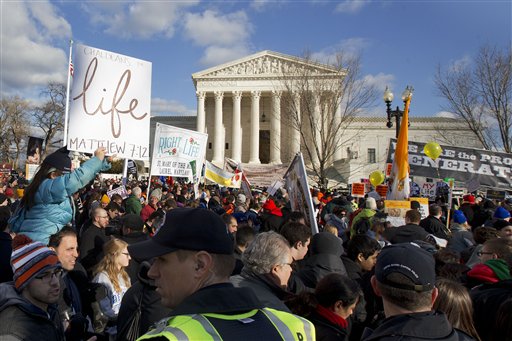Every January since 1974, on the anniversary of Roe v. Wade, pro-lifers have made their way from around the country to march to the Supreme Court as part of the largest pro-life rally in the United States. The 2015 rally marks the case's 42nd anniversary.
The rally features several speakers, including pro-life congressional representatives, TV personalities, leaders of pro-life organizations, and a featured high school student. Even Pope Francis showed his support on Twitter.
Every Life is a Gift. #marchforlife
— Pope Francis (@Pontifex) January 22, 2015
This year, the March for Life added a two-day expo with more than 50 organizations represented. They also held an all-day conference to further educate the thousands of young participants on making a difference on the issue, both culturally and legally.
A D.C. police officer present at the Supreme Court said he was surprised that the majority of participants were young adults and teenagers.
Young marchers involved made their presence known, chanting, "We are the pro-life generation."
Lila Rose, president of Live Action, calls abortion "the greatest human rights abuse of our day," which explains why so many millennials have gotten involved. There was added buzz surrounding a House vote on H.R. 36, the Pain-Capable Child Protection Act.
The bill would have prohibited abortions after 20 weeks, with the exception of rape or incest. A similar law has already passed in 10 states.
But after Republican women could not reach a consensus on the language of the bill, it was pulled. Many people who were interviewed at the rally said they were "disappointed" with the House not voting on the bill. Overall, there was hope that the fight will continue.
The No Taxpayer Funding of Abortion Act, which was passed Thursday in the House, is still a priority for these groups to keep taxpayer money from contributing to the abortion industry.
Despite the disagreements within the Republican party, Sen. Tim Scott said Congress (S.C.) will still bring the Pain Capable Act to the floor, and House Majority Leader Kevin McCarthy (Calif.) urged Congress to be prompt in voting on it.
